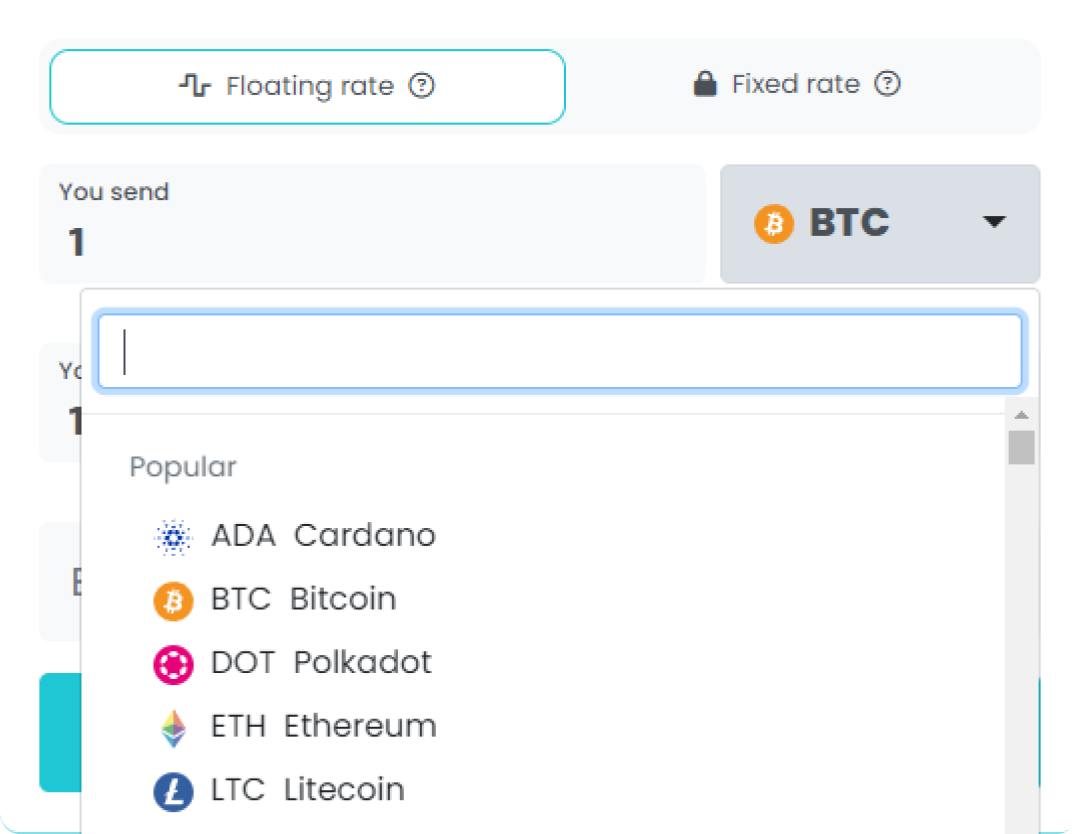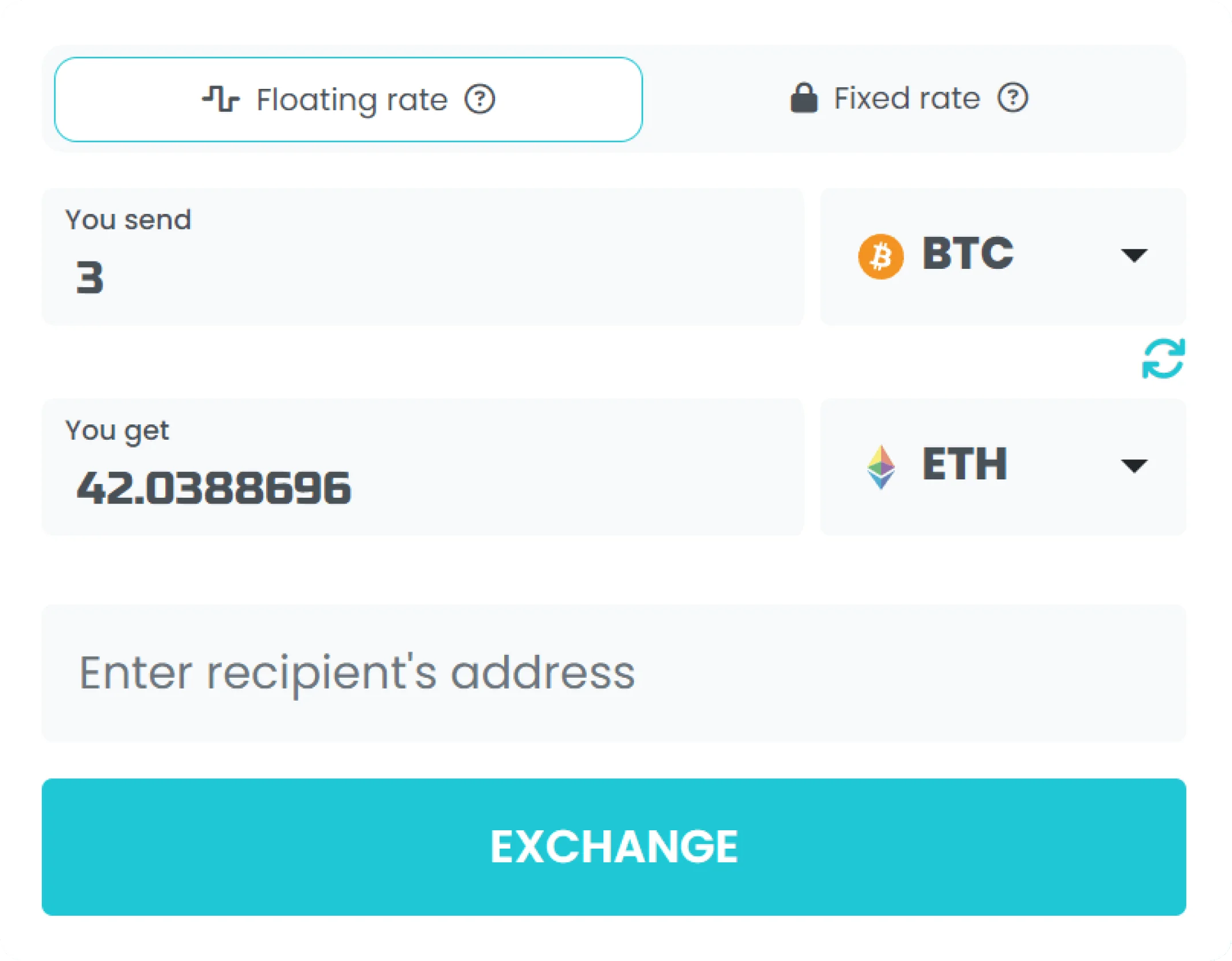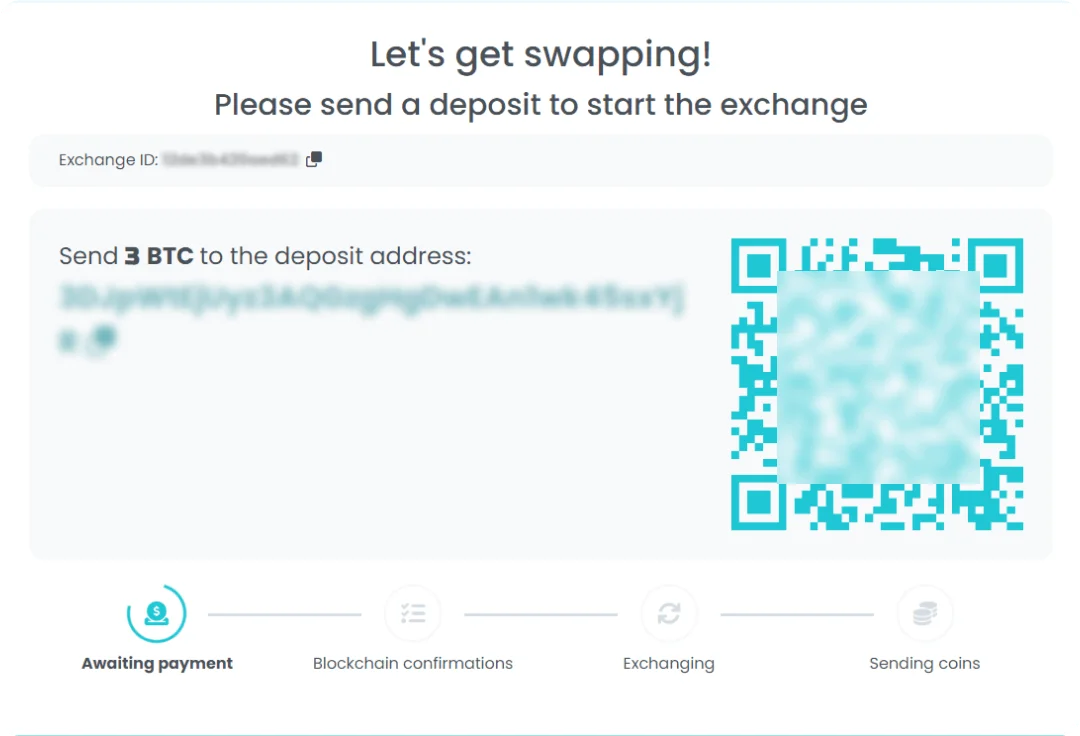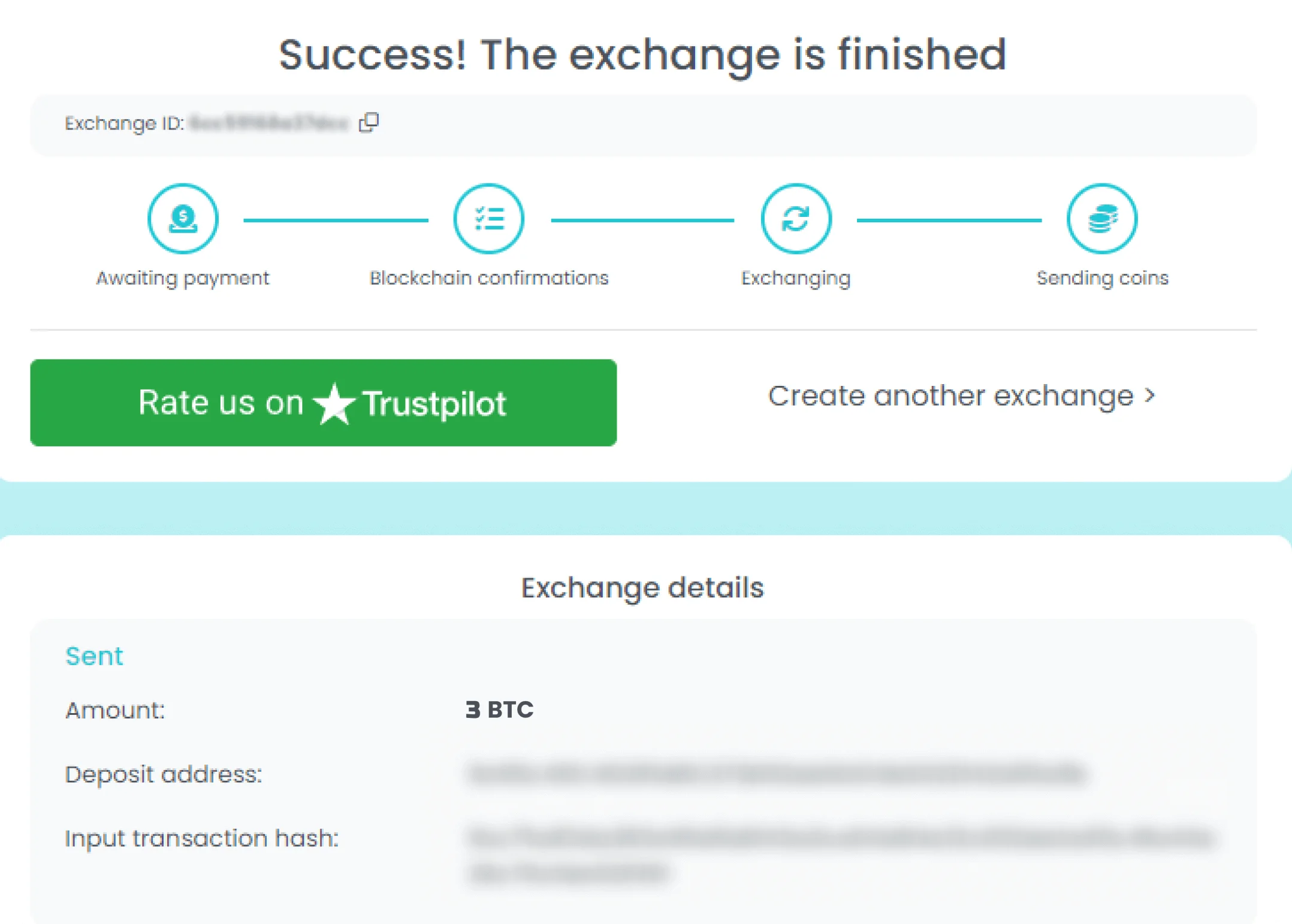How to Exchange Ripple (XRP)
Exchange XRP instantly
Swap Ripple (XRP) in a few clicks on Exchang.io.
Registration and limits free service.
Historical Price Chart
Ripple Current Market Data
| Name | Ripple |
|---|---|
| Price | $0.53 |
| Price Change 24h | 0.87% |
| Price Change 7d | -3.42% |
| Price Change 30d | -16.09% |
| Price Change 60d | -13.49% |
| Market Cap | $28,775,937,322.98 |
| Circulating Supply | 54,374,512,255.00 XRP |
| Volume 24h | $683,285,922.43 |
How to Exchange Ripple in Just a Few Straightforward Steps
If you are looking to XRP exchange, you are in the right place. Swap Ripple in a matter of minutes using Exchang.io crypto exchange. Just adhere to these 4 simple steps.




Benefits of Exchanging XRP on Exchang.io

Simple
We make sure not to overload our website with unnecessary elements. Only the things you need for smooth Ripple conversions.Simple and clear.

Secure
Exchang.io is a safest place to exchange XRP. Get XRP anonymously, without KYC and registration.
In touch
Write to us in any unclear situation with XRP swaps. Our support team is happy to help you 24/7.
Fast
We are constantly upgrading our platform to make Ripple exchanges really fast. The average speed for the swap is about 5-15 minutes.Popular Ripple trading pairs
Here are some popular XRP trading pairs. You can buy XRP with every listed coin on Exchang.io.
How Much Ripple Can I Exchange on Exchang.io?
Exchanging Ripple on Exchang.io is unlimited. You can start swapping XRP right now starting from the lower limit of ≈ $3.
There are no upper limits for Ripple exchanges at Exchang.io. Exchange Ripple with other cryptocurrencies from the list of over 700 coins as much as you want to.
Cross-chain exchanges are available; just choose any coin on any network and click the Exchange button, and we'll do the rest for you
Why exchange Ripple?
Things you will be able to do with exchanged XRP:
With Ripple (XRP) cryptocurrency, you can participate in fast and low-cost cross-border transactions. The Ripple network enables quick transfers of XRP, making it an efficient option for international payments.
Another use case for Ripple is its integration with various exchanges, allowing you to buy and sell XRP easily. You can take advantage of price fluctuations and trade XRP on different platforms to potentially profit from market movements.
Ripple's technology, specifically the XRP Ledger, has gained traction among financial institutions for its potential in revolutionizing remittance services. Banks and other financial entities are exploring the use of XRP as a bridge currency to facilitate faster and cheaper transactions.
Holding XRP in a cryptocurrency wallet offers you the opportunity to be part of the Ripple ecosystem and contribute to the network's stability. By holding XRP, you can also participate in securing the XRP Ledger through the concept of consensus that Ripple employs.
What is Ripple?
Ripple is a digital payment protocol and cryptocurrency that was created by Ripple Labs in 2012. It aims to facilitate fast, low-cost international money transfers and streamline cross-border transactions. The native cryptocurrency of the Ripple network is called XRP. While other cryptocurrencies like Bitcoin and Ethereum utilize a decentralized blockchain, Ripple operates on a more centralized system known as the XRP Ledger.
Unlike many other cryptocurrencies, Ripple's primary focus is not to replace traditional banking systems or become a peer-to-peer currency. Instead, it aims to work alongside existing financial institutions and improve their efficiency. Ripple offers a suite of software solutions, including the RippleNet network, which enables banks and payment providers to connect and facilitate faster, more reliable transactions. This approach sets Ripple apart from other cryptocurrencies that prioritize decentralization and aim to disrupt traditional financial systems.
One key difference between Ripple and other cryptocurrencies is its consensus algorithm. While Bitcoin and most cryptocurrencies use proof-of-work (PoW) or proof-of-stake (PoS) mechanisms to validate transactions and secure their networks, Ripple utilizes a unique consensus algorithm called the XRP Ledger Consensus Protocol. This algorithm relies on a network of trusted validators to confirm transactions, making it faster and less energy-intensive compared to PoW-based cryptocurrencies.
Another distinction lies in Ripple's supply and distribution. Ripple Labs holds a significant amount of XRP, which has led to debates about centralization and control over the cryptocurrency. However, Ripple has taken steps to address these concerns, such as placing a large portion of its XRP holdings into escrow accounts and committing to regular disclosures. This distinguishes Ripple from other cryptocurrencies where the supply and distribution may be more decentralized and community-driven.
Additionally, Ripple's transaction speed and scalability set it apart. While Bitcoin and Ethereum can experience congestion and slower transaction times during periods of high demand, Ripple claims to have the ability to process up to 1,500 transactions per second. This makes it more suitable for applications requiring quick and efficient settlement, such as international remittances.
In terms of market presence, Ripple has gained significant partnerships with various financial institutions around the world. By collaborating with banks and payment providers, Ripple aims to improve cross-border payments and reduce the time and cost associated with traditional methods. However, the adoption of Ripple's cryptocurrency, XRP, by these institutions is not universal, and there have been debates about the necessity of XRP for utilizing Ripple's network.
To interact with Ripple and hold XRP, users can utilize wallets that support the cryptocurrency. These wallets allow users to store, send, and receive XRP securely. Additionally, individuals and institutions can buy XRP on various cryptocurrency exchanges, where they can also monitor its price fluctuations and trade it against other cryptocurrencies or fiat currencies.
In conclusion, Ripple is a cryptocurrency and digital payment protocol designed to facilitate fast and cost-effective cross-border transactions. Its focus on working with traditional financial institutions, unique consensus algorithm, centralized distribution, transaction speed, and scalability set it apart from other cryptocurrencies like Bitcoin and Ethereum. While Ripple has gained significant partnerships and provides software solutions for financial institutions, the adoption and use of its native XRP cryptocurrency remain subject to debate within the industry.
Brief History of Ripple
Ripple (XRP) is a cryptocurrency that was launched in 2012 by Chris Larsen and Jed McCaleb. It was created to facilitate fast and low-cost international money transfers. Ripple operates on a decentralized technology called the XRP Ledger, which is an open-source blockchain. The XRP token is used within the Ripple network to enable secure and quick transactions.
Ripple's main goal is to streamline cross-border payments by connecting different financial institutions through its payment protocol. It aims to offer a more efficient alternative to traditional banking systems, which are often slow and expensive. The use of XRP as a bridge currency helps eliminate the need for multiple intermediaries and reduces settlement times.
One of Ripple's notable features is its consensus algorithm, called the Ripple Protocol Consensus Algorithm (RPCA). Unlike other cryptocurrencies that rely on mining, Ripple's consensus algorithm selects a set of trusted validators to confirm transactions. This design allows for faster transaction processing, making it ideal for real-time settlements.
Ripple has partnerships with numerous banks and financial institutions worldwide. These collaborations have contributed to the widespread adoption of Ripple's technology, with many institutions using the RippleNet network for cross-border payments. The availability of XRP on various cryptocurrency exchanges has also made it easily accessible for investors and traders.
Over the years, Ripple has faced regulatory challenges due to its classification as a security by some authorities. However, Ripple Labs, the company behind Ripple, has been working to resolve these issues and clarify the legal status of XRP. This ongoing process has had an impact on the price of XRP, with fluctuations occurring in response to regulatory developments.
Despite the challenges, Ripple remains one of the most prominent players in the cryptocurrency industry. Its focus on providing efficient cross-border payment solutions has earned it recognition and support from financial institutions. The XRP token continues to be traded on various exchanges, allowing investors to buy and sell XRP based on market demand.
Ripple's technology has also been adopted by remittance providers and money transfer services, further expanding its reach. The fast settlement times and low fees associated with using XRP have made it an attractive option for businesses and individuals looking to send value internationally.
To store XRP, users can utilize wallets compatible with the XRP Ledger. These wallets provide a secure way to manage and access XRP holdings. As with any cryptocurrency, it is essential to choose reputable wallet providers and take necessary precautions to protect one's digital assets.
In conclusion, Ripple (XRP) has played a significant role in revolutionizing cross-border payments with its digital asset and payment protocol. Its focus on speed and cost-efficiency has garnered widespread adoption from financial institutions and investors alike. Despite regulatory challenges, Ripple continues to strive towards its mission of enabling seamless global transactions.
Ripple Key Advantages and Unique Features
Ripple is a cryptocurrency that offers several key advantages and unique features. Firstly, Ripple aims to enable fast and low-cost international transactions by utilizing its decentralized digital payment protocol. This sets it apart from traditional banking systems, where cross-border transfers can be slow, expensive, and subject to intermediaries. By leveraging Ripple's network, users can send and receive funds quickly and securely, making it an ideal choice for individuals and businesses seeking efficient global transactions.
One notable feature of Ripple is its consensus algorithm, called the XRP Ledger. Unlike other cryptocurrencies that rely on proof-of-work or proof-of-stake mechanisms, Ripple employs a distributed agreement protocol. This enables faster confirmation times for transactions, with the ability to settle them in just a few seconds. The XRP Ledger can handle a high volume of transactions, making it more scalable than some other blockchain networks.
Ripple's native coin, XRP, plays a crucial role within the ecosystem. It serves as a bridge currency, facilitating liquidity and enabling seamless exchange between different fiat currencies and digital assets. This feature eliminates the need for multiple intermediaries and reduces costs associated with currency conversion. Additionally, XRP can be used as a liquidity provider for financial institutions, enabling them to improve their cross-border payment processes.
Another advantage of Ripple is its focus on partnerships with various financial institutions and banks worldwide. Through these collaborations, Ripple has gained widespread adoption and integration into existing financial systems. Many renowned institutions have recognized the benefits of Ripple's technology and have chosen to incorporate it into their operations. This extensive network of partnerships enhances the utility and value of XRP as a widely accepted cryptocurrency.
Furthermore, Ripple's consensus mechanism and design ensure the security of transactions and the overall integrity of the network. Its robust technological infrastructure has been designed to prevent double-spending and protect against potential attacks. This provides users with confidence in the reliability and trustworthiness of the Ripple network.
Additionally, Ripple offers users the option to create and manage their wallets to store XRP securely. Wallets can be software-based or hardware devices, providing users with different levels of convenience and security. This empowers individuals to have full control over their funds without relying on third-party custodians.
In conclusion, Ripple's key advantages lie in its ability to facilitate fast and cost-effective international transactions, its unique consensus algorithm, the utility of its native coin XRP as a bridge currency, extensive partnerships with financial institutions, robust security measures, and user-friendly wallet options. These features make Ripple a compelling choice for individuals and businesses looking for efficient global payments and seamless exchange of digital assets.
10 Facts About Ripple
- Ripple (XRP) is a popular cryptocurrency known for its fast and low-cost transactions, making it an attractive option for users and businesses alike.
- The Ripple network operates on a decentralized platform that enables secure peer-to-peer transactions without the need for intermediaries such as banks.
- Ripple's native cryptocurrency, XRP, plays a crucial role in facilitating these transactions by serving as a bridge currency between different fiat currencies.
- With a maximum supply of 100 billion XRP, the coin has been widely adopted by various financial institutions and payment processors for cross-border remittances and settlements.
- As the fourth-largest cryptocurrency by market capitalization, Ripple has gained significant recognition within the crypto industry.
- Many cryptocurrency exchanges offer XRP trading pairs, allowing users to easily buy, sell, and trade Ripple.
- The price of XRP experienced notable fluctuations throughout its existence, influenced by factors such as market demand, regulatory developments, and overall sentiment towards cryptocurrencies.
- To securely store Ripple and other cryptocurrencies, users can utilize digital wallets specially designed to hold and manage their assets.
- Ripple's technology, called the RippleNet, provides seamless integration with existing banking systems, offering financial institutions a cost-effective solution for global payments.
- Overall, Ripple has positioned itself as one of the best cryptocurrencies for efficient cross-border transactions, thanks to its innovative blockchain technology and widespread adoption.
What is the Best Place to Exchange XRP?
Via Exchang.io service you can effortlessly swap Ripple for over 700+ different assets. Begin by selecting XRP and your desired coin, paying attention to the network when making your choice. Next, provide the recipient's wallet address for the coin you're swapping to, and press 'Exchange' to continue. Deposit the required amount of XRP to the address displayed on the screen, ensuring you have the necessary amount to finalize the transaction. Once completed, check your wallet to confirm the arrival of your newly acquired coin. Exchang.io makes exchanging Ripple simple and convenient, allowing you to enjoy a seamless experience with an extensive selection of coins to choose from.
Do I need to create an account on Exchang.io to swap Ripple?
No, there's no need to create an account or provide personal information on Exchang.io to exchange Ripple. The platform is registration-free and doesn't require any ID verification. Simply follow the straightforward steps to buy Ripple with your preferred cryptocurrency.
How long does it take to exchange Ripple on Exchang.io?
The exchange process on Exchang.io is highly efficient and usually takes just a few minutes to complete. The actual time may vary slightly depending on network traffic and transaction confirmation times.
What is the minimum amount needed to swap XRP on Exchang.io?
Exchang.io has a minimum amount requirement for exchanging XRP on its platform. However, please note that this minimum amount may change, so it's advisable to check the platform for the latest requirements.
Is Exchang.io legit? Why should I trust Exchang.io?
Exchang.io is a trustworthy platform with a team of experienced crypto enthusiasts who have over 7 years of industry expertise. Their primary focus is to provide users with a convenient, fast, and transparent service. Exchang.io welcomes feedback from the community through its social networks in order to constantly improve. You can also check reviews on Exchang.io.com to gain further confidence.
What are some popular XRP trading pairs?
Some popular XRP trading pairs on Exchang.io include XRP/BTC, XRP/ETH, XRP/LTC, and XRP/USDT, among others.
Are cross-chain exchanges available for Ripple?
Yes, Exchang.io supports cross-chain exchanges for Ripple. You can choose any coin on any network, click the 'Exchange' button, and Exchang.io will handle the rest.
